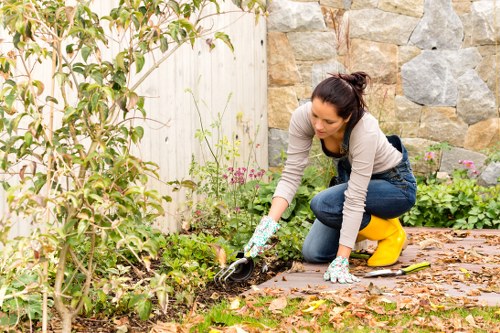Garden Maintenance in Catford: A Comprehensive Guide
Introduction to Garden Maintenance

Garden maintenance in Catford is essential for creating a vibrant and healthy outdoor space. Whether you're a seasoned gardener or a beginner, understanding the specific needs of your garden can lead to a flourishing landscape. This guide explores the best practices for maintaining your garden in Catford, ensuring it remains beautiful throughout the seasons.
Catford's unique climate and soil conditions require tailored maintenance strategies. From selecting the right plants to implementing effective watering techniques, every aspect plays a crucial role in the overall health of your garden.
In this article, we'll delve into various aspects of garden maintenance, including plant selection, soil preparation, pest control, and seasonal care, providing you with the knowledge needed to maintain a stunning garden year-round.
Understanding Catford’s Climate

Catford enjoys a temperate maritime climate, characterized by mild winters and warm summers. This climate is conducive to a wide variety of plants, but it also presents specific challenges that gardeners must navigate.
The average temperature in Catford ranges from 2°C in the winter to 22°C in the summer. Seasonal rainfall is fairly consistent, which means adequate drainage is essential to prevent waterlogging and root diseases.
Understanding these climatic conditions helps in selecting plants that are well-suited to Catford’s weather patterns, ensuring they thrive with minimal intervention.
Soil Preparation and Improvement

Healthy soil is the foundation of any successful garden. In Catford, the soil tends to be a mix of clay and loam, which retains moisture effectively but can become compacted over time.
To improve soil quality, it's important to regularly add organic matter such as compost or well-rotted manure. This enhances soil structure, promotes beneficial microbial activity, and provides essential nutrients to plants.
Testing your soil's pH levels can also be beneficial. Most plants prefer a slightly acidic to neutral pH (6.0-7.0), so adjusting the pH with lime or sulfur can optimize plant growth.
Plant Selection for Catford Gardens

Selecting the right plants is crucial for a thriving garden in Catford. Consider native plants as they are well-adapted to the local climate and soil conditions, requiring less maintenance and water.
Popular choices include lavender, roses, and perennials like hostas and daylilies. These plants not only add beauty but also attract pollinators, enhancing the garden's ecosystem.
Additionally, incorporating a mix of evergreen and deciduous plants ensures year-round interest and structural variety in your garden design.
Seasonal Garden Maintenance

Effective garden maintenance in Catford requires attention to seasonal changes. Each season presents unique challenges and opportunities for garden care.
In spring, focus on planting new seeds, pruning overgrown shrubs, and preparing beds for summer growth. Summer demands regular watering, weeding, and pest control to keep plants healthy and vibrant.
Autumn is the time for harvesting, clearing fallen leaves, and protecting plants from the upcoming winter. Winter maintenance includes pruning dormant plants and planning for the next gardening season.
Watering Techniques
Proper watering is essential for maintaining a healthy garden. In Catford’s climate, it’s important to water deeply but infrequently to encourage deep root growth.
Using drip irrigation systems can help conserve water and deliver it directly to the plant roots, reducing evaporation and runoff. Mulching around plants also helps retain soil moisture and suppress weeds.
Monitoring soil moisture levels and adjusting your watering schedule based on seasonal rainfall ensures your plants receive the right amount of water without overwatering.
Pest and Disease Management
Keeping pests and diseases at bay is a critical aspect of garden maintenance. Regularly inspecting plants for signs of infestation or disease allows for early intervention.
Integrated Pest Management (IPM) techniques, such as encouraging natural predators, using organic pesticides, and practicing crop rotation, can effectively manage pest populations without harming beneficial insects.
Maintaining plant health through proper nutrition and watering also makes them more resistant to pests and diseases, reducing the need for chemical interventions.
Pruning and Trimming
Pruning is essential for maintaining the shape and health of your plants. Regular trimming promotes air circulation, reduces the risk of disease, and encourages new growth.
Different plants require different pruning techniques. For example, roses benefit from deadheading, while fruit trees need thinning to optimize fruit production.
Understanding the specific needs of each plant species in your garden ensures that pruning enhances their growth and overall appearance.
Mulching Benefits
Mulching is a valuable practice in garden maintenance. It helps regulate soil temperature, retain moisture, and suppress weed growth, creating a more favorable environment for plant roots.
Organic mulches, such as bark, straw, or compost, also improve soil quality as they break down over time, adding nutrients and enhancing soil structure.
Applying a layer of mulch around your plants annually can significantly reduce maintenance efforts and promote a healthier garden ecosystem.
Fertilizing Your Garden
Fertilizing provides essential nutrients that plants need to grow and thrive. In Catford, using a balanced fertilizer with nitrogen, phosphorus, and potassium can support robust plant growth.
Organic fertilizers, such as compost or bone meal, are excellent choices as they release nutrients slowly and improve soil health. It’s important to follow recommended application rates to avoid over-fertilizing, which can harm plants and the environment.
Regular fertilization, tailored to the specific needs of your plants, ensures continuous growth and vibrant blooms throughout the growing season.
Seasonal Planting Strategies
Strategic planting according to the seasons can enhance the beauty and resilience of your garden. Spring is ideal for planting annuals and perennials, while autumn is perfect for bulbs and hardy shrubs.
In summer, focus on heat-tolerant plants and ensure they receive adequate water. Winter planting includes selecting evergreen plants and those that can withstand frost, providing year-round structure and color.
By aligning your planting schedule with seasonal changes, you can maintain a dynamic and thriving garden that adapts to the weather throughout the year.
Professional Garden Maintenance Services
While DIY garden maintenance is rewarding, sometimes professional assistance can elevate your garden’s health and appearance. Professional garden maintenance services in Catford offer expertise in plant care, landscaping, and problem-solving.
Services typically include regular lawn care, pruning, fertilizing, pest control, and seasonal clean-ups. Hiring professionals ensures that your garden receives consistent and high-quality care, allowing you to enjoy a beautiful outdoor space without the hassle.
Consider contacting local garden maintenance providers to discuss your garden’s specific needs and discover tailored solutions that can help your garden thrive.
DIY Maintenance Tips
For those who prefer a hands-on approach, regular DIY maintenance can keep your garden in top shape. Here are some essential tips:
- Regular Weeding: Remove weeds promptly to prevent them from competing with your plants for nutrients and water.
- Deadheading: Remove faded flowers to encourage new blooms and maintain plant appearance.
- Soil Health: Aerate the soil periodically and add organic matter to maintain its structure and fertility.
- Pest Monitoring: Keep an eye out for signs of pests and take immediate action to manage infestations.
- Proper Tool Maintenance: Keep your gardening tools clean and sharp to ensure efficient and safe use.
Conclusion
Maintaining a garden in Catford requires a blend of knowledge, effort, and the right strategies. By understanding the local climate, preparing your soil, selecting suitable plants, and implementing effective maintenance practices, you can cultivate a thriving and beautiful garden.
Whether you choose to manage your garden yourself or enlist professional help, consistent care is key to ensuring your outdoor space remains a source of pride and enjoyment.
Ready to transform your garden? Contact us today to explore professional garden maintenance services in Catford and take the first step towards your dream garden.